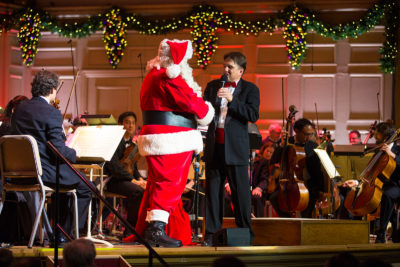
As far as the Boston Pops Orchestra is concerned, the holiday season has begun in Beantown. The group held its first “Holiday Pops” show of the year on Wednesday, starting the season at Symphony Hall with a festive opening.
The Boston Pops Orchestra was formed as a popular music contemporary to the Boston Symphony Orchestra in 1885. The group, which has seen the likes of John Williams and Adolf Neuendorff among its conductors, has performed Holiday Pops concerts since 1973.
The environment at a Holiday Pops concert is unlike anything else held at Symphony Hall through the whole year. The audience sits around cabaret-style tables, ordering drinks and finger foods with their family and friends gathered around. The balconies and stage are decorated with garland and lights. The atmosphere is an almost perfect mix between sophisticated and casual.
The Boston Pops are joined for their holiday shows by the Tanglewood Festival Chorus, bringing the total number of people on stage for the busy show to at least 100.
The first half of Wednesday night’s show was somewhat similar to a normal night at the symphony, albeit with a rather festive theme. After opening with the class Christmas hymn “Hark! The Herald Angels Sing,” the Pops went on to perform the “Hallelujah Chorus” from “Messiah” and excerpts from “The Nutcracker.”
The orchestra played these more traditional pieces with the beauty and precision that has made them famous across the world. The strings expertly captured the playfulness and of these festive works. The basses sounded like a single instrument, the tubas and cellos playing together as one.
The Tanglewood Chorus, in the portions that they were included in, served as an excellent and equally talented counterpart to the orchestra. During the sections in which they were not needed, more than a few hilarious choreographed reactions to the different songs could be seen.
There was not a note is out of place. It’s nearly impossible to criticize the Boston Pops, not only because everything is performed to the highest level of excellence, but because the show is so much fun that even if it wasn’t, it would be hard to notice any flaws.
The last piece before the intermission was an half-hour rendition of Charles Dickens’ “A Christmas Carol.” Actor Will Le Bow narrated a condensed version of the 1843 novel while illustrations from Irish artist P.J. Lynch were displayed on a screen. The Pops provided the scoring underneath.
“A Christmas Carol” was one of many high points in the show. Le Bow was simply magnificent, performing each character and spirit of the story with a different voice, gesturing and moving about as he read. The orchestra’s music was dramatic and emotional when brought to the forefront and subdued when it needed to be.
Boston Pops conductor Keith Lockhart has conducted the group since 1995, conducting more than 1,800 Boston Pops concerts. It doesn’t appear as if his enthusiasm for the art has faltered at all. Complete with a seemingly irremovable smile and a distinctive, humble bow, Lockhart exudes the aura of a man who loves his job.
Lockhart conducted with the ease and joy that only a concert of this nature could call for. During the second half of the show, when the group let loose a bit more and performed their famous rendition of “The 12 Days of Christmas,” Lockhart could be seen mimicking a kickline performer from the podium or directing the musicians while pretending to swim.
While the first half of the concert might have traditional and festive, the second half was nothing but fun. The Pop’s rendition of “The 12 Days of Christmas,” arranged by David Chase, had the crowd clapping, laughing and singing along as the Tanglewood Chorus sang each verse of the repetitive carol to the tune of a different famous classical or holiday piece.
“If someone ever asks you what the definition of showstopper is,” Lockhart said in reference to the hilarious and unconventional arrangement, “that’s it.”
Then came the man of the hour: Santa Claus.
Entering through the back door, St. Nick made his way to the stage to greet Lockhart before heading back into the audience to lead them in “A Merry Little Sing Along” and take pictures.
The Pops closed with a stirring performance of “White Christmas” before receiving their third standing ovation of the night.
While introducing one of the earlier pieces, Lockhart turned to Dickens. He was puzzled and struck by the author’s use of the phrase “Keep Christmas all the year” while describing Scrooge’s transformation. “
“What does it mean to keep the Christmas spirit more than just one day a year? … What happens after the wrapping paper’s thrown away?” Lockhart asked the audience. “How do we move past the holidays?”
Lockhart didn’t have that answer, but he certainly knew a good way to start.
“You can’t keep it alone. And that’s why we’re here tonight.”
























































































































